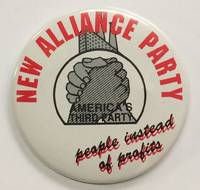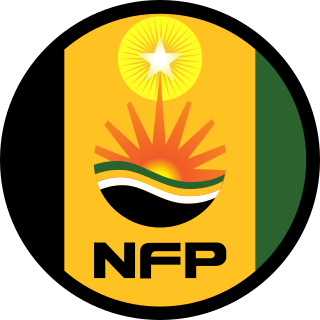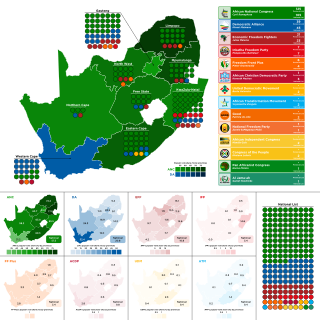
The Freedom Front Plus is a right-wing political party in South Africa that was formed in 1994. It is led by Pieter Groenewald. Since 2024, it is a part of the current South African government of national unity together with the African National Congress (ANC), the Democratic Alliance and other parties.

The United Democratic Movement (UDM) is a centre-left, social-democratic, South African political party, formed by a prominent former National Party leader, Roelf Meyer, a former African National Congress and Transkei homeland leader, General Bantu Holomisa, and a former ANC Executive Committee member, John Taylor. It has an anti-separatist, pro-diversity platform; and supports an individualist South Africa with a strong moral sense, in both social and economic senses.

General elections were held in South Africa on Wednesday, 14 April 2004. The African National Congress (ANC) of President Thabo Mbeki, which came to power after the end of the apartheid system in 1994, was re-elected with an increased majority.

The New Alliance Party (NAP) was an American political party formed in New York City in 1979. Its immediate precursor was an umbrella organization known as the Labor Community Alliance for Change, whose member groups included the Coalition of Grass Roots Women and the New York City Unemployed and Welfare Council. These groups were all associated with controversial psychologist and political activist Fred Newman, whose radical healthcare collectives, Centers for Change and Marxist International Workers Party, were active in grassroots politics in New York City.

General elections were held in South Africa on 22 April 2009 to elect members of the National Assembly and provincial legislatures. These were the fourth general elections held since the end of the apartheid era.

Municipal elections were held in South Africa on 18 May 2011, electing new councils for all municipalities in the country. Municipal elections are held every five years, and the previous municipal elections were held in 2006. The first municipal elections following the reorganisation of municipalities took place in December 2000.

The Congress of the People (COPE) is a South African political party formed in 2008 by former members of the African National Congress (ANC). The party was founded by former ANC members Mosiuoa Lekota, Mbhazima Shilowa and Mluleki George to contest the 2009 general election. The party was announced following a national convention held in Sandton on 1 November 2008, and was founded at a congress held in Bloemfontein on 16 December 2008. The name echoes the 1955 Congress of the People at which the Freedom Charter was adopted by the ANC and other parties, a name strongly contested by the ANC in a legal move dismissed by the Pretoria High Court.

The Cape Independence Party (CAPEXIT), previously called the Cape Party, is a political party in South Africa which seeks to use all constitutional and legal means to bring about Cape independence, which includes the entire Western Cape, Northern Cape, six municipalities in the Eastern Cape, and one municipality in the Free State. The area includes all municipalities in those provinces with an Afrikaans-speaking majority. In 2009, it was claimed to have had a membership of approximately 1,000 people across South Africa, but official membership figures are not made public. The party currently holds two seats on the Cape Town City Council.

The National Freedom Party (NFP) is a South African political party. It was launched on 25 January 2011 by Zanele kaMagwaza-Msibi, former chairperson of the Inkatha Freedom Party (IFP), along with other former IFP members. Similar to the IFP, the party's main base is in KwaZulu-Natal.

General elections were held in South Africa on 7 May 2014, to elect a new National Assembly and new provincial legislatures in each province. It was the fifth election held in South Africa under conditions of universal adult suffrage since the end of the apartheid era in 1994, and also the first held since the death of Nelson Mandela. It was also the first time that South African expatriates were allowed to vote in a South African national election.

The Patriotic Alliance (PA) is a right-wing political party in South Africa, formed in November 2013 by, among others, businessmen Gayton McKenzie and Kenny Kunene. Since 2024, it is a part of the current South African government of national unity together with the African National Congress (ANC), the Democratic Alliance and other parties.

General elections were held in South Africa on 8 May 2019 to elect a new President, National Assembly and provincial legislatures in each province. These were the sixth elections held since the end of apartheid in 1994 and determined who would become the next President of South Africa.
The council of the City of Cape Town in the Western Cape, South Africa is elected every five years by a system of mixed-member proportional representation. Half of the councillors are elected by first-past-the-post voting from individual wards, while the other half are appointed from party lists so that the total number of party representatives is proportional to the number of votes received. By-elections are held to replace the councillors elected by wards if a vacancy occurs.

Good is a South African political party that was formed in December 2018. It is led by its founder Patricia de Lille, current Minister of Tourism and former mayor of Cape Town, who is also the party's sole member in the National Assembly. The party's stronghold is the Western Cape and mainly draws support from the Coloured community.

The Electoral Commission of South Africa (IEC) announced on 20 March 2019 that a record number of 48 parties had registered candidates for the national parliamentary election. This is 19 more parties that contested the 2014 national elections. In the provincial legislature elections, the total number of parties registering candidates were:

General elections were held in South Africa on 29 May 2024 to elect a new National Assembly as well as the provincial legislature in each of the nine provinces. This was the 7th general election held under the conditions of universal adult suffrage since the end of the apartheid era in 1994. The new National Council of Provinces (NCOP) will be elected at the first sitting of each provincial legislature.

Cilliers Brink is a South African politician who is the Mayor of Tshwane, in office since 28 March 2023. A member of the Democratic Alliance, he was the party's Shadow Minister of Cooperative Governance and Traditional Affairs from 2020 until 2023 and a Member of Parliament (MP) from 2019 to 2023. He was the party's Shadow Deputy Minister of Cooperative Governance and Traditional Affairs between 2019 and 2020.

The United Independent Movement (UIM) is a South African political party founded by Neil de Beer, former national security advisor to Nelson Mandela and a former uMkhonto we Sizwe operative.
The City of Tshwane Metropolitan Municipality council consists of 214 members elected by mixed-member proportional representation. 107 are elected by first-past-the-post voting in 107 wards, while the remaining 107 are chosen from party lists so that the total number of party representatives is proportional to the number of votes received. In the election of 1 November 2021, no party won a majority of seats on the council.
The People's Movement for Change (PMC) is a South African political party formed in November 2023 by Marius Fransman, former Deputy of International Foreign Affairs and former Chairperson of the African National Congress (ANC) in Western Cape.
















